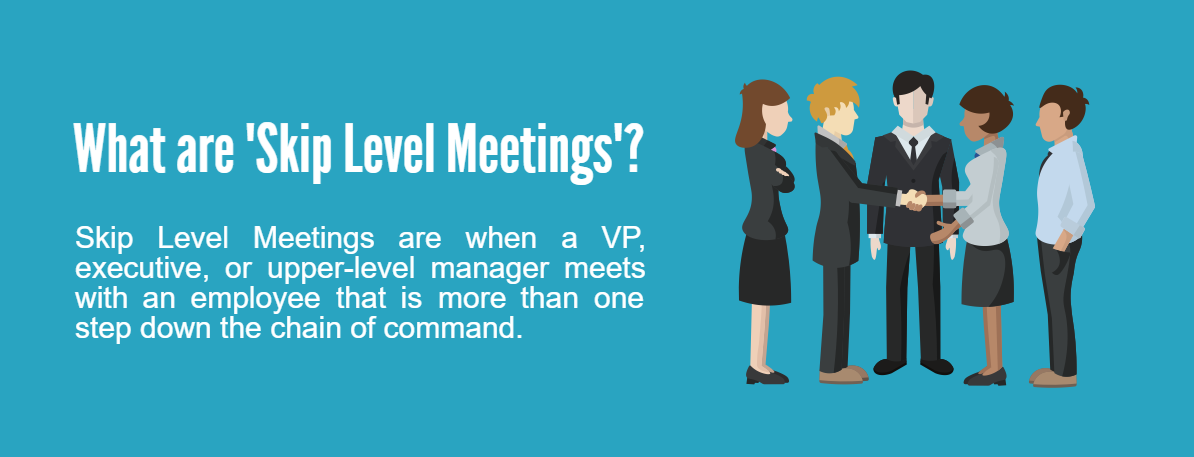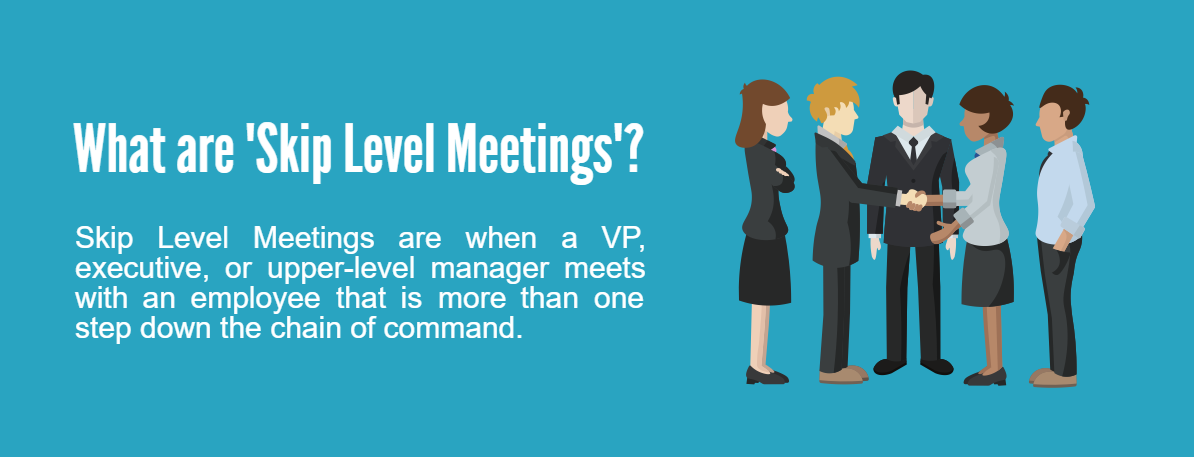As a leader, it is critical to look at everything as a big picture. This is where Skip Level Meetings come into play.
Skip-level meetings help you look at your organization from the ground-up.
Essentially, these meetings give you insight into things you may have missed if you regularly only interact at the management or C-level. This will also help you create a stronger bond with employees at all levels of your organization.
In this article, we’ll cover:
- What are skip level meetings?
- Tips for holding Skip Level Meetings
- Benefits of these meetings, and
- Tools to help you with them
What are Skip Level Meetings?
A skip level meeting is when a CEO or simply a higher up manager meets with employees that are more than one step down the chain of command.
These meetings can be as simple as asking how employees like working for the company. You may also discuss things like:
- what changes, or improvements they believe might help them in their everyday work environment
- ideas for possible new products / initiatives
- general sentiment in the company, goals for themselves and their team
- your company vision and priorities, which lower level employees sometimes miss out on
Skip Level Meetings are meetings that allow higher level employees to talk with lower level employees in a safe and productive environment; these meetings build a bridge from Boss to the worker and create a comfortable working environment where everyone feels heard.
Priority Matrix can facilitate skip level meetings. Try it free here:
“Normal” Meetings vs. Skip Level Meetings?
In a normal meeting a higher level manger would meet with the person directly under them to discuss employee productivity. Regular meetings also consist of technical updates.
On the other hand, in a Skip Level Meeting, the higher level manger skips down to the employees working under the person they spoke to in the “normal” meeting. The skip level meetings have the goal of giving employees the opportunity to voice how they feel about different things going on in the company, as well as increasing transparency throughout the organization as a whole.
Questions for Skip Level Meetings
- How do you feel about work lately?
- What have you accomplished lately that you’re most proud of? What about since you’ve been with the company?
- How do you measure success in your role?
- What’s blocking you from being more successful than you already are?
- What tool would be most helpful for you in your current role?
- What would you do differently if you were in the role of your team lead? Why?
- What are your professional goals during the next year here? The next 3 years?
- What do you think the current goals of the company are?
- How do you feel your role contributes to those goals?
- What ideas do you have for innovation in your team? In the company?
>> Click here to download a PDF of this Skip Level Meeting Question List <<
Tips for Skip Level Meetings
- Don’t expect your employees to open up to you
As an authority figure, who has the ability to fire them, your employees may not be so up front with their opinions. If they have something negative to say, it might not come out because your employees might be afraid of losing their jobs if they something that isn’t very positive about the company.
To remedy this try engaging with your employees before hand, join them on coffee breaks and discuss things like Game of Thrones or The Super Bowl; let your employees see that you are just like them. You are a regular person who has interests and responsibilities outside the work place. These small interactions will make your employees more comfortable speaking openly with you during Skip Level Meetings.
- Skip level meetings are not a way to spy on your employee’s supervisor.
These meetings are meant to be constructive and totally open. This means asking for information on your employee’s supervisor is out of bounds.
Yes, maybe there is something that your employee’s direct supervisor is doing that they may not like, but you should not make them feel like they are gossiping or bad mouthing about their boss.
- Don’t keep your employee’s supervisor out of the loop.
If you decide to schedule a meeting with one of your employees tell their supervisor before hand.
Catching them off guard might make them worried about their job security or make them defensive. Remember that these meetings are not meant to be sneaky or mean spirited; everything said during these meetings should be seen as constructive criticism.
Make sure to let the supervisor know that they are not in trouble and you just want to get a better connection with the other employees in the company.
What are the Benefits of Skip Level Meetings?
Skip Level Meetings provide a way for employers and employees to interact and get to to know each other.
Beyond this, skip level meetings can be very helpful when moving into a leadership, especially in a new company. Conducting Skip Level Meetings will allow you to speak with the people who are in the thick of it, and know what works best in their work environment.
After hearing what they have to say you can make judgment calls on what to change and what to keep the same; then you can discuss these things with their supervisors so that they can be implemented.
Some further benefits of regular, skip-level meetings include:
- Increased transparency in your business
- A more open environment for sharing ideas, which facilitates innovation
- A universal understanding of your company vision and priorities
- Increased employee engagement, as everyone feels valued and included by executives
Tools to Facilitate Skip-Level Meetings
While skip-level meetings are a great way to get deep insights about your company, meetings like these can be time consuming, and result in little action taken.
For detailed insight into employee sentiment, productivity, and ideas, consider implementing a tool like Priority Matrix.
Priority Matrix is a lightweight management solution that provides actionable insights across your organization.
With Priority Matrix, executives, directors, and managers can keep a close overview of employees across every level of the organization, without hovering over their shoulder or popping in for long meetings.
Below, check out how Priority Matrix gives managers a preview on who is working on each piece of one larger project:

Priority Matrix also provides insightful productivity reports, among dozens of other capabilities to help you run your organization more effectively.

If you’re into skip level meetings, it’s safe to assume you value visibility, transparency, and accountability in your business. Priority Matrix could be just the tool you need to keep a holistic view of what’s going on across your company.
Sign up for your free trial here to get started:
Watch a video on the topic below:
Further Resources:
Online Course on Skip Level Meetings
Read Next:
What President Eisenhower Can Teach Us About Prioritization
An Actionable Guide to Prioritization and Delegation
Time Management Strategies for Busy People
>> Share the Infographic on Twitter<<





